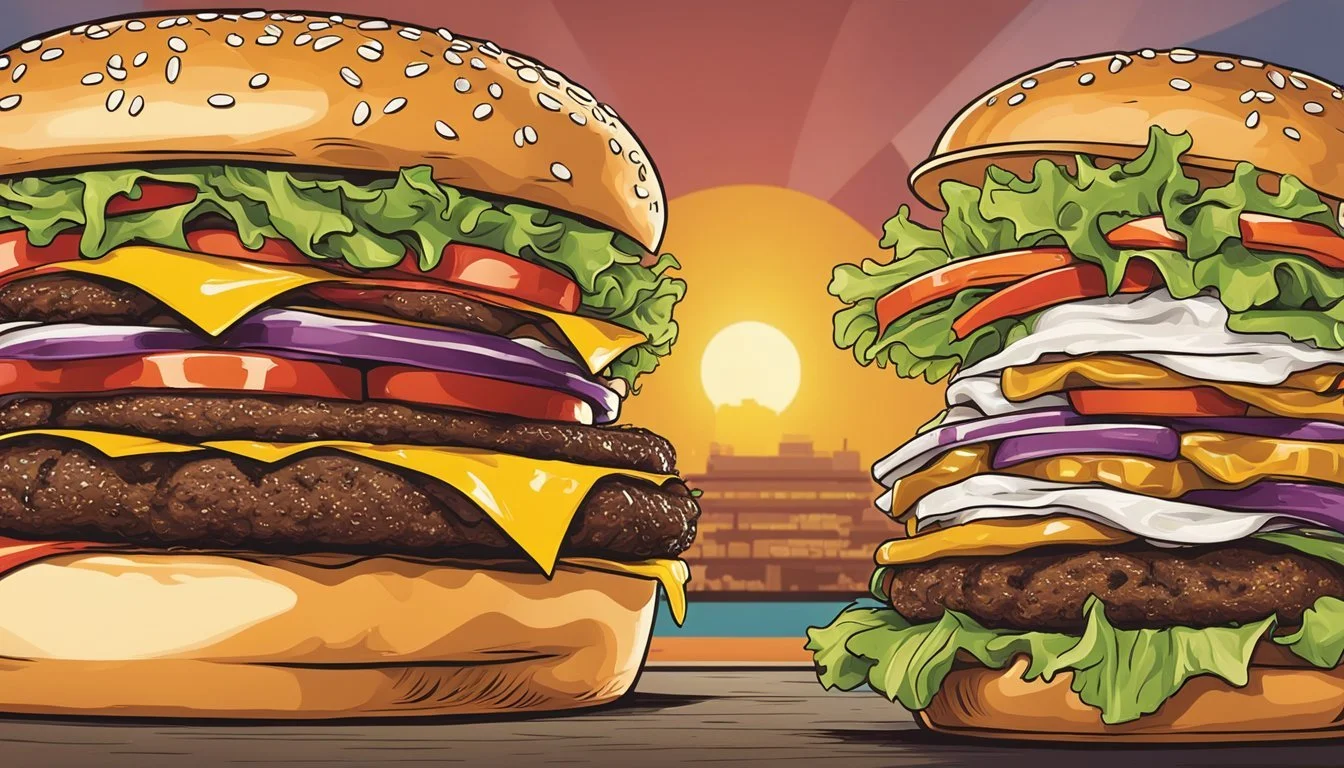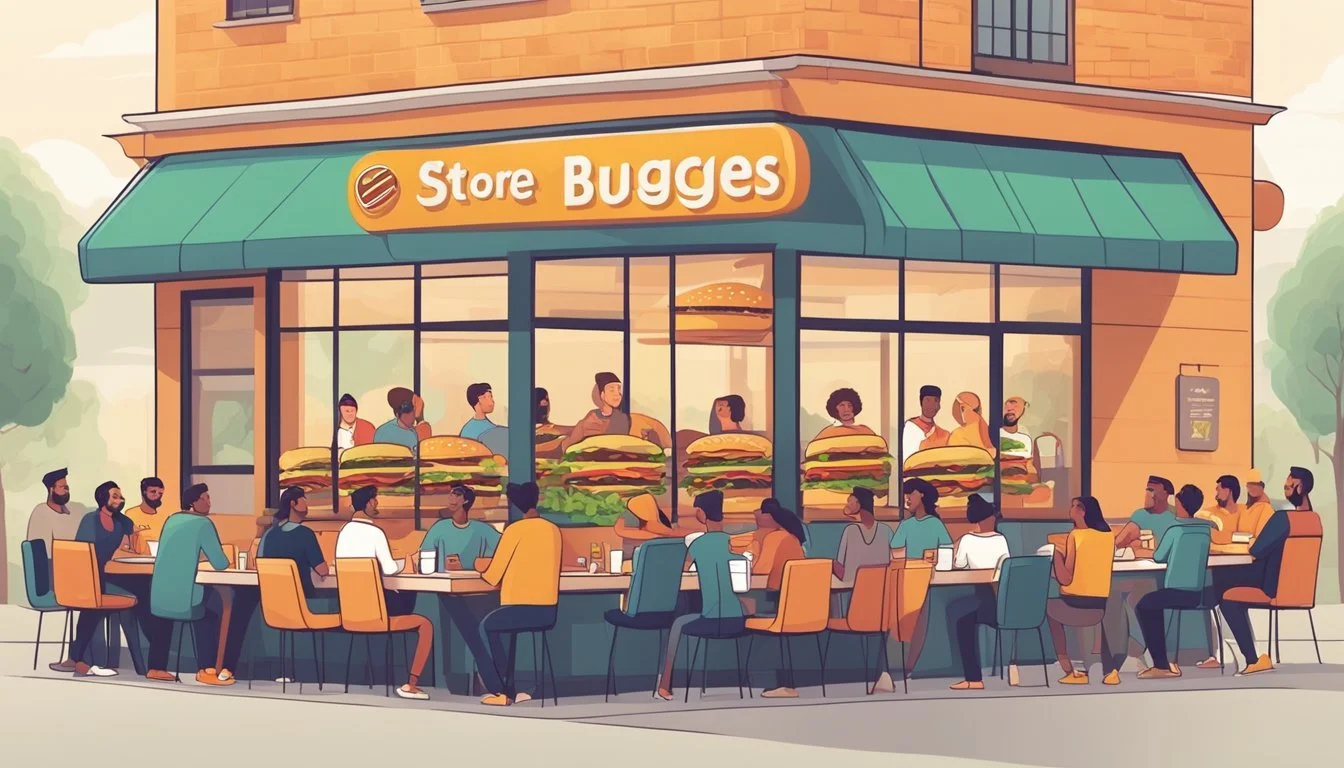Burger King vs Fatburger
A Comparative Analysis of Burger Quality and Value
When comparing fast-food burger joints, Burger King and Fatburger stand out for their distinct approaches to serving up some of America's favorite meals. Burger King, a global titan known for its flame-grilled Whopper, operates a vast network of locations offering a consistent and familiar menu. In contrast, Fatburger, known for its customizable burgers and West Coast origins, tends to appeal to those looking for a more personalized dining experience.
As these two burger chains compete for the title of the superior burger provider, various factors come into play. Their respective signatures—the Whopper and the Fatburger—exemplify their appeal, with Burger King's offering simplicity and flame-grilled taste, while Fatburger emphasizes variety and size options. The debate involves not just taste, but also aspects like ingredient quality, menu variety, and overall dining experience.
History and Expansion
Burger King started with its first store in Miami, Florida in 1954. It has since grown into a global fast-food giant with over 18,000 outlets in 100 countries, as of 2021. The company's expansion has been aggressive, relying on a franchise model that has allowed rapid growth and a wide-reaching presence across the globe.
Fatburger, on the other hand, was established slightly earlier, in 1947, in Los Angeles, California. Their footprint is notably smaller but no less significant in the regions they serve. Fatburger remains an iconic brand, especially on the West Coast, with a presence in around 200 locations worldwide.
Both establishments have a shared focus on expansion which is evident in their history. Here’s a quick glance at their growth trajectories:
Brand Founded Origin Global Presence Burger King 1954 Miami, Florida 18,000+ outlets Fatburger 1947 Los Angeles, CA 200+ locations
While Burger King has had a more global approach, Fatburger has maintained a strong identity tied to its Californian roots and West Coast influence, which is reflected in its menu and branding. As these chains continue to develop, they keep shaping customers’ experiences through their history and expansion strategies.
Core Offerings
Burger King and Fatburger both offer a range of burgers and sides but are distinguished by their signature offerings. These fast-food joints cater to diverse preferences including vegetarian choices and various side items.
Signature Burgers
Burger King:
Whopper: A quarter-pound flame-grilled beef patty, tomatoes, lettuce, mayonnaise, ketchup, pickles, and onions on a sesame seed bun.
Double Cheeseburger: Two savory grilled beef patties, topped with a simple layer of melted American cheese, pickles, mustard, and ketchup on a toasted sesame seed bun.
Fatburger:
Fatburger: Known for its large, juicy beef patty, Fatburger's classic includes lettuce, tomato, onion, relish, pickles, mayonnaise, and mustard on a toasted bun, using lean beef.
Vegetarian Options
Burger King:
Impossible Whopper: A plant-based patty served with tomatoes, lettuce, mayonnaise, ketchup, pickles, and onions, all on a toasted sesame seed bun.
Fatburger:
Does not have a widely known signature vegetarian burger but offers add-ons like veggie toppings and customizable options that can accommodate vegetarian preferences.
Sides and Extras
Burger King:
Fries: Crispy and golden, available in multiple sizes.
Onion Rings: Breaded and fried to a golden crisp.
Fatburger:
Fries: Hand-cut and cooked to order.
Onion Rings: Thick-cut and battered, these are available alongside fries as a popular choice.
Both establishments offer a selection of soft drinks, milkshakes, and desserts to complement their core offerings.
Ingredients and Taste
When debating the merits of Burger King versus Fatburger, one must evaluate the quality of the ingredients and the resulting flavor profiles of their signature burgers. These two aspects are pivotal in determining which burger joint takes the lead in the preference of burger enthusiasts.
Quality of Ingredients
Burger King is known for its range of hamburgers and cheeseburgers that often include a flame-grilled beef patty, tomatoes, lettuce, mayonnaise, ketchup, pickles, and onions. The flame-grilled technique imparts a distinctive smokiness to the beef, setting it apart from competitors. However, the quality of beef may vary as it aims to balance cost efficiency with flavor.
In contrast, Fatburger offers the "Fatburger," renowned for its large, juicy patties made from lean beef. Patrons can find fresh lettuce, tomato, onions, pickles, relish, mayonnaise, and mustard nestled within a toasted bun. Fatburger stands out for its dedication to using fresher, less processed ingredients, giving it an edge in terms of the perceived quality of their burgers.
Beef: Both restaurants feature 100% beef patties, yet Fatburger's emphasis on lean beef may appeal to those seeking a less greasy option.
Lettuce and Tomato: Freshness is key; Fatburger often has a reputation for fresher produce, while Burger King's global chain operations might affect its consistency.
Flavor Profiles
The flavor of a burger from Burger King is deeply influenced by the flame-grilled cooking method which produces a distinct taste that many customers can instantly recognize. Their special sauce, typically applied to their signature sandwiches such as the Whopper, adds a tangy and savory dimension to the burger. Burger King's use of bacon in many of its offerings also introduces a rich, savory element that many patrons enjoy.
Fatburger patrons have a wealth of toppings to choose from, all at no extra cost. The customizability allows for a complex flavor profile tailored to individual preference. The Fatburger's lean beef patty is well-seasoned, and when paired with complimentary toppings such as grilled mushrooms, jalapeños, and A.1. sauce, results in a rich and satisfying taste.
Special Sauce: Burger King's special sauce adds a unique tang, while Fatburger relies on a wide array of condiments to satisfy diverse tastes.
Toppings: Choices range from standard lettuce and tomato to gourmet options like grilled onions and green peppers, giving Fatburger an advantage in taste customization.
Culinary Innovations
In the competitive landscape of fast food, Burger King and Fatburger have both made significant strides in culinary innovation, each with their distinct approach.
Burger King introduced the Impossible Whopper, a plant-based burger aimed at providing a meat-free alternative for vegetarians and environmentally conscious consumers. This innovation taps into the growing demand for sustainable dining options. The patty is made from soy protein, potato protein, coconut oil, sunflower oil, and heme, a molecule derived from genetically modified yeast that gives it a meaty flavor.
Nutritional Content for Impossible Whopper:
Calories: Comparable to a traditional Whopper
Protein: Satisfactory levels, suitable for vegetarians
On the other side, Fatburger focuses on offering customizations and their own unique take on condiments. Their burgers can be paired with various toppings and their special sauce, enhancing the traditional burger experience.
Innovation Highlights:
Lean Beef Options: Fatburger's lean beef maintains taste while managing caloric intake.
Special Sauces: Adds a bold twist to each burger with unique flavor profiles.
Both chains demonstrate an understanding that innovation is not just about introducing new products but also improving what they already have. Burger King and Fatburger stay ahead of culinary trends, adapting their offerings to meet the diverse tastes and nutritional demands of their customers, with a clear focus on adding value to the conventional fast-food burger experience.
Nutritional Values
When choosing between Burger King and Fatburger, customers often compare the nutritional values of their favorite burgers. This comparison typically hinges on aspects like calorie content and the availability of healthier options, including those with higher protein and vegetable content.
Calorie Counts
Burger King offers a regular hamburger containing approximately 241 calories, positioning it as a lower-calorie choice for patrons concerned with managing their caloric intake. This option provides a straightforward burger experience without the burden of excess calories often found in larger, more elaborate selections.
On the other hand, Fatburger presents the XXL "Double King" Fatburger, a larger offering packing 1268 calories. This burger caters to those with a more robust appetite or individuals seeking a more indulgent meal, reflecting a significant increase in calorie content.
Healthier Options
For customers prioritizing healthier choices, both Burger King and Fatburger have options that merit consideration. Burger King, with its reputation for having customizable meals, enables patrons to include fresh vegetables, such as lettuce, offering a way to incorporate more nutrients into their meal.
Fatburger also steps up in the health conversation with the Impossible Burger, a plant-based alternative. It contains 526 calories and provides a way for guests to enjoy a burger that's both rich in taste and protein, while possibly reducing the environmental impact compared to traditional beef burgers.
Customer Experience
When it comes to choosing between Burger King and Fatburger, the customer experience at each location plays a crucial role in shaping patrons' preference. Factors such as the ambiance of the restaurant and the quality of service are key differentiators for these fast food burger chains.
Restaurant Atmosphere
Burger King: The customer experience at Burger King is designed around efficiency, often featuring a fast-paced environment that prioritizes quick service. They have evolved their customer experience strategy through their digital app which provides convenience and personalization.
Ambiance: Typically utilitarian, with a clean and functional seating area.
Digital Experience: Emphasis on reaching customers through innovative online and digital app engagement.
Fatburger: Fatburger offers a distinct dining experience with a focus on creating a more relaxed atmosphere that reflects the West Coast vibe from where it originated.
Ambiance: More personal and inviting with an emphasis on creating a laid-back experience.
Value Perception: It may be perceived as offering better value through a more inviting atmosphere.
Service Quality
Burger King: The service at Burger King is geared towards speed and consistency, with a systematic approach characteristic of a global fast food chain.
Service Approach: Drive-through and counter service focused on minimizing wait times.
Customer Satisfaction: Continuous analysis of the customer journey to identify and address frustration points.
Fatburger: Service at Fatburger is typically considered attentive and friendly, aligning with its smaller, niche-market presence.
Service Approach: A warmer, more personalized service experience.
Value Perception: Emphasis on customer satisfaction through attentive service, contributing to the perception of value.
Pricing and Value
When comparing Burger King and Fatburger, pricing strategy plays a significant role in determining value for money. Both establishments offer a variety of burgers, including the classic cheeseburger and options with BBQ sauce, showcasing the diversity in their menu.
Burger King is typically known for its competitive pricing and regularly offers deals that might include a burger, fries, and a drink at a lower price point than buying items separately. They often feature promotions via their mobile app and coupons, which can present additional savings for customers.
Fatburger, on the other hand, positions itself slightly higher on the price scale, reflecting its image of providing premium quality burgers. Their burgers can be customized with an array of free toppings, potentially enhancing the value perceived by the customer. A standard Fatburger cheeseburger is usually more expensive than its Burger King counterpart, but it's marketed as a more substantial and customizable option.
The following is a brief comparison of a basic meal from both chains:
Item Burger King Fatburger Cheeseburger $1.00 - $2.50 $3.50 - $5.00 Fries $1.69 - $2.19 (small) $2.50 - $3.50 (small) BBQ Addition $0.50 (BBQ sauce) $0.00 (free toppings) Value Meal $3.00 - $5.00 $5.50 - $8.00
Note: Prices vary by location and are subject to change.
Customers at Burger King can enjoy a relatively low-cost meal with the option of adding BBQ sauce for a minimal extra charge. Fatburger's prices reflect its lean premium beef and broader selection of toppings at no additional cost, providing a different kind of value to those who prioritize customization and quality over cost.
Brand Presence and Marketing
Burger King's brand presence is vast and global, with a robust marketing strategy that leverages its long-standing identity as a major player in the fast-food burger industry. With campaigns often characterized by a direct and sometimes cheeky tone, they implement memorable slogans and innovative advertisements. For example, their ads have boldly compared their burger size to that of McDonald's, illustrating confidence in their product.
Fatburger, though smaller in brand reach compared to Burger King, upholds a strong presence on the West Coast of the United States. Their marketing tends to emphasize the quality and customizability of their burgers, appealing to a consumer base that values fresh, made-to-order meals.
Aspect Burger King Fatburger Global Reach Extensive Limited Tone Direct, Humorous Quality-focused Slogan Have it your way The Last Great Hamburger Stand™ Target Market Broad Demographics Fresh-food Enthusiasts
Both chains utilize social media and online platforms to engage with their customers, but Burger King often takes a more aggressive approach to their digital campaigns to drive conversation and controversy, which has proven effective in maintaining high visibility within the fast-food industry.
In their branding, Burger King tends to position themselves as the daring alternative, willing to push the envelope in marketing. They have employed brand archetypes and crafted messages that resonate broadly, ensuring they stay competitive.
Fatburger, on the other hand, positions itself as an underrated contender, prioritizing a crafted and personal approach to burger making, which is communicated in their more locally-targeted marketing endeavors. Their approach appeals to those seeking a familiar yet distinctive fast-food experience.
Consumer Loyalty and Feedback
In assessing consumer loyalty between Burger King and Fatburger, it becomes evident that customer feedback plays a significant role. Burger King, as a global fast-food chain, has employed various strategies to evaluate customer loyalty and satisfaction, leading to quality assurance and product improvement.
Burger King has made noticeable efforts to climb the ladder of consumer fidelity. Fatburger, although smaller in reach, also maintains a dedicated customer base, priding itself on using fresh ingredients and traditional cooking methods. Both brands focus on understanding and responding to consumer preferences, which is critical in the fast-food industry.
The distinction in consumer loyalty can be partly attributed to the different business strategies and brand images that the two chains uphold. Burger King's focus on value offerings and extensive franchise may yield a widespread but less intense customer devotion, whereas Fatburger's niche market approach garners a more deep-seated yet demographically limited customer loyalty.
For a comparative look at loyalty and feedback:
Burger King:
Utilizes customer feedback through various channels for improvement.
Broad customer base with diverse preferences.
Fatburger:
Cultivates loyalty through premium product offerings.
Receives customer feedback that often highlights quality over cost.
In summary, the engagement with and reactions to customer feedback differ between the two, which in turn affects consumer loyalty. Both Burger King and Fatburger have their unique advantages and challenges in nurturing customer relationships within the competitive fast-food landscape.
Conclusion
When considering Fatburger and Burger King, consumers have distinct experiences at each establishment. Fatburger is renowned for its customizable burgers, featuring lean beef and a variety of toppings. Customers appreciate the quality ingredients and the ability to tailor their burger to their tastes.
Burger King, on the other hand, is a global chain recognized for its signature flame-broiled taste. With its staple offerings such as the Whopper, it typically provides a quicker service model and more cost-effective options that cater to a broader audience on a budget.
Fatburger stands out with its:
Variety of fresh toppings
Lean beef patties
Made-to-order approach
Burger King is known for its:
Quick service
Familiar flavors
Competitive pricing
When choosing between the two, it ultimately depends on the individual's preferences and priorities. Those valuing a more bespoke burger experience might lean towards Fatburger. Those who favor fast service and value for money might find Burger King to be the preferable option. Both have their own strengths and unique appeal in the fast-food burger industry.










